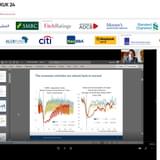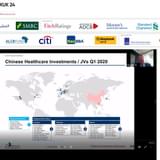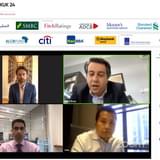This week, Indonesia’s government seemingly punished JP Morgan by severing its ties with the bank after it downgraded the country’s stock market by two notches in November, citing powerful market forces set into motion by Donald Trump's election victory in the US.
The Indonesian finance minister, Sri Mulyani Indrawati, surprised many investors when she announced the bank was barred from submitting an underwriting proposal for its next issuance of dollar-denominated Islamic bonds, suspended as a primary dealer and from underwriting its debt, and that it would no longer receive tax benefits from the state.
In a statement to the Financial Times, Indrawati, a former managing director of the World Bank, said that JPMorgan had “provoked irrational behaviour” by making negative comments at a time of great economic uncertainty.
She also said the government would add a new condition to the Ministry’s agreements with the remaining investments banks that act as primary dealers marketing and selling Indonesia’s government bonds, designed to ensure their “professionalism, accuracy of information and freedom from conflicts of interest.”
Investment banks should be more mindful of the impact their insights can have on markets, Indrawati warned.
HSBC, Standard Chartered, Citigroup and Deutsche Bank remain the biggest traders in Indonesian debt.
JPMorgan’s ties to Indonesia go back a long way. The bank opened its first branch in the country under the Chase Manhattan brand in 1968. Since 2012, JPMorgan has served as an underwriter on nearly US$14bn worth of Indonesian government bond sales, including US$3.4bn last year, according to data from Bloomberg.
For now, JP Morgan will still be allowed to conduct its private banking without any impediment.
Is a Trend Emerging?
Indonesia is not the only country to react badly to unfavourable reports by financial institutions. On January 9, the finance minister of Turkey lashed out against the Moody’s rating agency, after it said Turkish bank profits would be hit significantly this year.
According to Moody’s, Turkish banks will suffer in 2017 due to an increase in non-performing loans and a “general worsening” of the investment environment.
“We expect asset quality trends to worsen in this year, driven by the combination of high inflation, lira depreciation and the general worsening of the investment climate because of security issues and geopolitical tensions," the report said.
This did not go unnoticed by Bulent Gedikli, an adviser to President Tayyip Erdogan, who responded through Twitter: “Moody's statement doesn't fit the reality of Turkish economy or its banking sector.”
In July 2016, the head of research AK investment, Mert Ulker, lost this license and after he published a report analysing the economic impact of July’s coup attempt.
In 2014, former Brazilian president, Dilma Rousseff publicly shamed an analyst at Banco Santander Brazil after she published a report saying that Brazil economy would suffer if Rousseff were re-elected.
Some analyst believes that these events are becoming more frequent in EMs as governments, feeling increasingly threatened by uncertainty in the US and Europe, higher US interest rates, and unfavourable reports from key institutions (credit rating agencies, investment banks, and asset managers), grow concerned about accelerated capital outflows.
There is some basis for concern. The International Financial Corporation (IFC) reported that since November, investors have pulled out US$23bn from emerging markets.
Some, however, caution that any animosity towards these institutions should be treated within their own context.
“It’s too early to call it a trend. Governments, not only in EM, have sometimes taken issue with rating agencies and independent reports, but it has always been isolated events,” said Thomas Christiansen, an emerging market credit portfolio manager
This week, Indonesia’s government seemingly punished JP Morgan by severing its ties with the bank after it downgraded the country’s stock market by two notches in November, citing powerful market forces set into motion by Donald Trump's election victory in the US.
The Indonesian finance minister, Sri Mulyani Indrawati, surprised many investors when she announced the bank was barred from submitting an underwriting proposal for its next issuance of dollar-denominated Islamic bonds, suspended as a primary dealer and from underwriting its debt, and that it would no longer receive tax benefits from the state.
In a statement to the Financial Times, Indrawati, a former managing director of the World Bank, said that JPMorgan had “provoked irrational behaviour” by making negative comments at a time of great economic uncertainty.
She also said the government would add a new condition to the Ministry’s agreements with the remaining investments banks that act as primary dealers marketing and selling Indonesia’s government bonds, designed to ensure their “professionalism, accuracy of information and freedom from conflicts of interest.”
Investment banks should be more mindful of the impact their insights can have on markets, Indrawati warned.
HSBC, Standard Chartered, Citigroup and Deutsche Bank remain the biggest traders in Indonesian debt.
JPMorgan’s ties to Indonesia go back a long way. The bank opened its first branch in the country under the Chase Manhattan brand in 1968. Since 2012, JPMorgan has served as an underwriter on nearly US$14bn worth of Indonesian government bond sales, including US$3.4bn last year, according to data from Bloomberg.
For now, JP Morgan will still be allowed to conduct its private banking without any impediment.
Is a Trend Emerging?
Indonesia is not the only country to react badly to unfavourable reports by financial institutions. On January 9, the finance minister of Turkey lashed out against the Moody’s rating agency, after it said Turkish bank profits would be hit significantly this year.
According to Moody’s, Turkish banks will suffer in 2017 due to an increase in non-performing loans and a “general worsening” of the investment environment.
“We expect asset quality trends to worsen in this year, driven by the combination of high inflation, lira depreciation and the general worsening of the investment climate because of security issues and geopolitical tensions," the report said.
This did not go unnoticed by Bulent Gedikli, an adviser to President Tayyip Erdogan, who responded through Twitter: “Moody's statement doesn't fit the reality of Turkish economy or its banking sector.”
In July 2016, the head of research AK investment, Mert Ulker, lost this license and after he published a report analysing the economic impact of July’s coup attempt.
In 2014, former Brazilian president, Dilma Rousseff publicly shamed an analyst at Banco Santander Brazil after she published a report saying that Brazil economy would suffer if Rousseff were re-elected.
Some analyst believes that these events are becoming more frequent in EMs as governments, feeling increasingly threatened by uncertainty in the US and Europe, higher US interest rates, and unfavourable reports from key institutions (credit rating agencies, investment banks, and asset managers), grow concerned about accelerated capital outflows.
There is some basis for concern. The International Financial Corporation (IFC) reported that since November, investors have pulled out US$23bn from emerging markets.
Some, however, caution that any animosity towards these institutions should be treated within their own context.
“It’s too early to call it a trend. Governments, not only in EM, have sometimes taken issue with rating agencies and independent reports, but it has always been isolated events,” said Thomas Christiansen, an emerging market credit portfolio manager at Nordea Asset Management.
“So far we have to trust the independence of the financial institutions. The risk of agencies not publishing reports out fear of retaliations is very unlikely. If so it would call into question the entire business model.”
“So far we have to trust the independence of the financial institutions. The risk of agencies not publishing reports out fear of retaliations is very unlikely. If so it would call into question the entire business model.”









